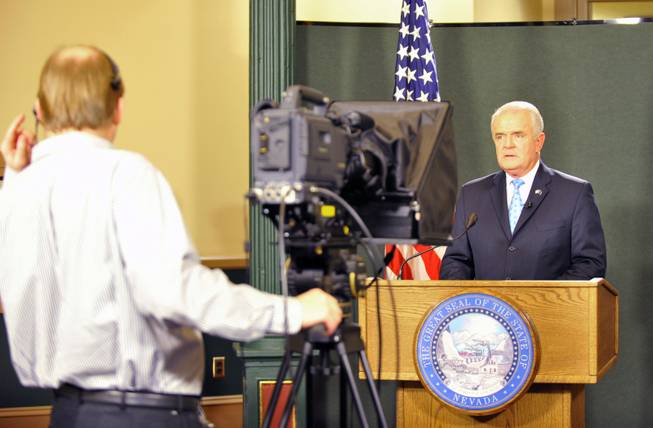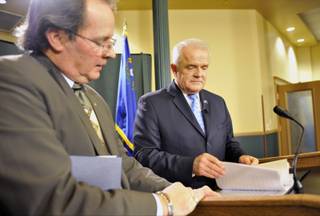
AP Photo/Scott Sady
Gov. Jim Gibbons prepares to give his state of the state speech upstairs in the Capitol building in Carson City on Monday, Feb. 8, 2010.
Published Monday, Feb. 8, 2010 | 7 p.m.
Updated Monday, Feb. 8, 2010 | 9:46 p.m.
Reader poll
State of the State
Gov. Jim Gibbons gave an emergency State of the State address at 6 p.m. Monday, Feb. 8. Video is courtesy KVBC Channel 3.
Sun Archives
- Governor plans emergency address on Nevada budget (2-7-10)
- Governor’s speech will lay out state’s budget problems (2-7-10)
- State budget comes up $800 million short (1-22-10)
- Forecast: Economy will begin to rebound in mid-2011 (1-22-10)
- Gibbons’ no-talk order further divides branches (1-22-10)
- Special session may require help of state Supreme Court (1-10-10)
Sun Coverage
In his State of the State address Monday night, Gov. Jim Gibbons said Nevada could cut its way out of an $881 million deficit -- and "reinvent" the role of state government in the process.
He repeatedly declared that new taxes should play no role in solving the crisis and blamed the Democratic-controlled Legislature for overriding his veto on a series of taxes last year, saying the increases have made the fiscal picture worse.
"We are working on solutions to turn this recession into an opportunity to reinvent our state’s government," Gibbons said. "We may never have an opportunity like this again. The dire economic situation we are facing now requires immediate action."
The picture is bleak. General fund revenues dropped 17 percent last year and the state faces a $1 billion shortfall between now and June 2011. Gibbons declared a special session of the Legislature for Feb. 23 to address the deficit.
Gibbons outlined a number of proposals to help address the state's shortfall, including 6 percent across-the-board cuts for state workers, layoffs, closing the Nevada State Prison in Carson City and reductions in state health care programs. He also used the speech to promote the education plan he unveiled last month, which would eliminate mandates for class sizes and full-day kindergarten. The plan would give local school districts more control over how funds are spent.
Gibbons noted the toll the recession had taken: 140,000 Nevadans have lost their jobs -- and another 90,000 are expected to join the unemployment rolls over the next 18 months. Home values plummeted 24.5 percent in the third quarter of 2009, the steepest decline of any state and more than six times the national average. The state's foreclosure rate is four times the national average, he said.
"As your Governor, my job is no different than that of your family or your business," Gibbons said. "You have your checkbook in one hand and your bills in the other, and you do your best to make ends meet. Just like Nevada’s families, just like Nevada’s businesses – it is time for Nevada government to face facts and make tough choices about the services we can and cannot afford."
Still, Gibbons returned time and again to the theme that state government and Nevadans must do more with less. The recession, he said, has provided the opportunity to trim the "bloated government services" residents enjoyed in the boom years.
"The economic crisis we face cannot be fixed with gimmicks or gadgets or temporary patches," Gibbons said. "The problem is our system. We must find a permanent solution. We must commit to a fundamental evaluation of what problems require government intervention and what problems we must fix ourselves. We must accept that limiting government means expanding personal responsibility. Nevada state government cannot afford to be all things to all people."
Gibbons' speech, with its Ronald Reagan quotes, seemed tailor-made for Nevada conservatives, the voters most likely to cast ballots in a June primary where the governor faces a tough challenge from former U.S. District Judge Brian Sandoval.
Nevada government may be bloated in the eyes of the state's libertarians, but it is also one of the smallest in the country.
Economists usually measure things by what portion of the total economic pie they consume. By that measurement, as a percentage of gross domestic product, which is essentially the state’s total economic output, Nevada has the leanest state government in the country, according to a Sun analysis. Another way to measure the size of the government is to determine what the state spends per capita. By this measurement, Nevada has the third leanest government in the country, at $1,136 per person in 2007, ahead only of flinty New Hampshire and impoverished Michigan.
Finally, if the measurement is public employees per capita, Nevada is the leanest state government in the nation, with 3.86 percent of the population working in the public sector. (That number includes local governments, which tend to be more robust than state government here in Nevada.)
Gibbons said he had honored his pledge not to raise taxes -- and vowed he would continue to do so.
"'No New Taxes' is not a cliché," he said. "To me it means more than that. It is a plan."
He added: "More government spending and more government mandates are never the answer. With 13 percent of our citizens unemployed, Nevada cannot continue to fund government as we know it today. Society is changing. State government must change with it. We must focus on the important services which ensure life, health, education and public safety. We will have to eliminate programs and services which make some people feel good, but which we simply can no longer afford. We must cut government spending to ease the burden on our citizens and our businesses."
Senate Majority Leader Steven Horsford said Gibbons' plan to have all state departments cut their budgets by 10 percent would not solve the crisis.
The effects, he said, could mean "the closure of a state prison, reduction of services to the elderly, and would roll back decades of progress that has been made to improve mental health, K-12 and higher education, further jeopardizing the general welfare and safety of all of us."
So to scale back cuts to education, Horsford said Democrats favor stepping up enforcement to collect unpaid taxes and ensuring that mining and other industries "pay their fair share of fees."
In other areas, he proposed reducing the cost of professional and service contracts, scaling back some state services to four days a week and cutting hours of operation and closing buildings and departments where necessary.
Horsford agreed that taxes were off the table in the short term, but said the Legislature must enact a "fair, broad-based and equitable" tax structure when the economy recovers.
"We must invest in economic growth and expansion," Horsford said. "And we must learn from the mistakes of the past so that we never return to this period of time where we are forced to choose between meeting our basic obligations and investing in our future."
Horsford encouraged Nevadans to weigh in at a series of public budget hearings in Las Vegas and Carson City this week.
Rory Reid, the Clark County Commission chairman and likely Democratic gubernatorial nominee, blamed Gibbons for the state's fiscal crisis.
"This situation is a result of the void of leadership in the governor’s office," Reid said in a statement. "The failure to develop any strategy for diversifying our economy – even in the face of global recession, brought us to this day. The signs have been there for years that Nevada's economy could not survive by relying only on tourism."
In his speech, Gibbons replayed last year's legislative session, singling out Democrats for tax increases.
"The balanced budget I submitted imposed no new taxes and allowed no expansion of state government," he said. "The Nevada Legislature disregarded my solution. They raised taxes one-billion dollars, and they made government bigger. They made the wrong call. I vetoed their new taxes and their inflated spending. I thought it was wrong then. I know it’s wrong now. I planned responsibly. They gambled on new taxes and we all lost."
He followed: "Despite the Legislature’s new taxes, our state revenues continue going down. More taxes have not helped Nevada’s economy. They never will."
In Gibbons' saying he kept his promise to not raise taxes by vetoing the 2009 tax increase, he's not being entirely truthful. He allowed a significant hotel room tax increase to become law, neither signing nor vetoing it.
Gibbons said he has ordered both the Nevada Commissions on Tourism and Economic Development to submit reports within 30 days with ideas on how to attracts visitors and businesses to the state. He also said he was working to bring green jobs to Nevada, citing a recycling pilot program in Carson City that he hopes to make statewide. If successful, he said the program could make Nevada "the recycling capital of the west."
"I am up to this challenge," he said. "I will never surrender. I am not a quitter."
J. Patrick Coolican contributed to this report.


Join the Discussion:
Check this out for a full explanation of our conversion to the LiveFyre commenting system and instructions on how to sign up for an account.
Full comments policy